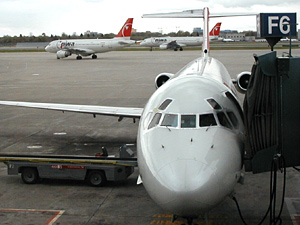|
Audio
Photos
More from MPR
Resources
|
July 14, 2005
 |
| The National Mediation Board did not set a deadline to respond to its offer of arbitration. Northwest and its mechanics could respond as soon as today. (MPR File Photo/Jeff Horwich) |
St. Paul, Minn. — Thursday ended without Northwest or its mechanics union, the Aircraft Mechanics Fraternal Association, responding to the offer to allow an arbitrator to settle their deep disagreements -- over wages, job cuts, and the outsourcing of aircraft repairs.
If either side declines arbitration, which most observers expect, the National Mediation Board must decide whether to release them from talks. At that point, the clock is ticking on a 30-day cooling-off period, after which a strike can occur.
Joel Denney, an aircraft industry analyst with Minneapolis-based Piper Jaffray, says the board's decision to end mediation was not a surprise. "We all knew that it was coming at this point, just mainly because both sides have said, 'We're at an impasse, this isn't going to work.' It's unfortunate to see it come down this path. But at some point they've got to get to a resolution and be forced to an agreement of some type," Denney says.
Northwest released a statement similar to one it has given often in recent weeks. The airline says it wants to work with the union to reach an agreement that provides fair wages and benefits, and "will allow Northwest to stem its unsustainable operating losses," which add up to some $3 billion over several years. The airline goes on to say that the union's latest offer falls far short of that goal.
AMFA union negotiators had no public comment. They sent a letter to members saying only that the are considering their response to the arbitration offer.
Ted Ludwig, president of AMFA Local 33 in the Twin Cities, doesn't speak for the negotiating team. But he says members are ready and willing to strike. "We feel it's our only chance to have our union survive," he says. "I know that sounds kind of ironic, but that's the position that we are in right now."
Ludwig says union members cannot accept a Northwest proposal to cut their numbers by almost half, an arrangement that would presumably mean more repairs done by outside repair stations.
A letter sent by the National Mediation Board to Northwest and the union quote "requests and urges" them to submit their dispute to arbitration. Arbitration is a step prescribed by law that may have little practical appeal to parties who have already been discussing their strike preparations for months.
"There is technically a chance that both sides would agree to binding arbitration, which would then avoid a strike, but I don't see that as very likely at this point," says John Budd, a professor of industrial relations at the University of Minnesota.
If the sides decline arbitration, they are not automatically released from talks. The National Mediation Board has one more chance to try mediation again, but Budd thinks they're likely to be released into the cooling off period. From that point, the two sides can keep talking on their own.
"They'll have at least 30 days, and they can continue to extend that cooling off period themselves if they're making progress and if they want to," Budd says. "So this doesn't make a strike a foregone conclusion."
In fact, AMFA reached this point in its last contract negotiations with Northwest four years ago. That time, intervention by President Bush extended the cooling-off period, and the two sides worked out a deal. This time, some observers doubt the president would step in, particularly after assurances by Northwest that it could keep flying during a strike.
The two sides will likely keep talking to some extent during a cooling off period. But with Northwest facing financial ruin and mechanics fearing for their very existence at the airline, both sides have drawn a hard line.
Though moving toward a strike would be ugly, financial analyst Joel Denney says movement of any kind is good at this point. "The faster you can get to a resolution, the faster you can reduce the bleeding at the airline. And that's what they really have to focus on," Denney says.
The National Mediation Board did not set a deadline to respond to its offer of arbitration. Northwest and its mechanics could respond as soon as today.



